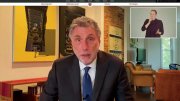There’s nothing like a global pandemic and economic meltdown to concentrate the mind and focus the joyous celebration of graduation on the very hard work at hand. And so it was with Harvard’s condensed, online University degree-conferral ceremony (“Honoring the Harvard Class of 2020”) and its diverse schools’ class days and celebrations on Thursday, May 28, as Tercentenary Theatre lay vacant (see the cover) on an occasion when 32,000 happy people would normally be present. The community has known since March 20 that the 369th Commencement, as usually understood, was not to be. In response, among so many other pressing priorities, University leaders, arts and music staff members, and students themselves joined forces to invent a suitable procedure for transforming candidates into graduates (with that hard-won, Harvardian credential officially bestowed)—and with the promise of proper festival rites in the future, when the pandemic loosens its grip on people worldwide.
The result was an innovation: an online morning broadcast, with President Lawrence S. Bacow hosting and conferring the aforesaid 8,174 degrees and certificates en masse, preceded and followed by online school events—some including high-wattage class-day speakers, and showing their newly minted alumni individually, and by name.
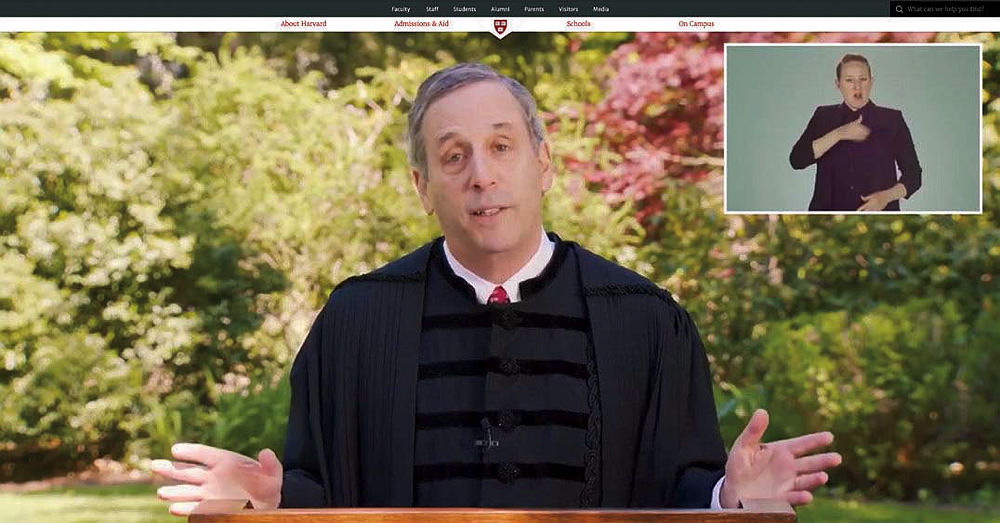
Lawrence S. Bacow
That bare outline does no justice to the emotions expressed, the very serious commentary on the nearly overwhelming issues of the day, or the community’s resilience in embracing both.
The depopulating of the campus on short notice in mid March left nearly everyone—and perhaps most poignantly, the College’s expectant seniors—bewildered and disoriented. Turning to the most basic indicators, a section of The Harvard Crimson’s senior survey on COVID-19-related matters found 35 percent of respondents reporting inadequate study space at home (or wherever); 21 percent struggling to schedule work from distant time zones; 17 percent having to juggle coursework and an obligation to help support their families; and 11 percent confronting illness (personally or within their families). One can only imagine how they felt.
Absent a Baccalaureate, Bacow sent a message to the seniors on May 27. “When we recruited you,” he wrote, “we offered you the opportunity to work with great faculty, and you did. But when we recruited the faculty to Harvard, we offered them the opportunity to work with extraordinary students, students who would challenge them like no other, and you did!…At times like this, I like to recall one of my favorite passages from the Talmud. It is the reflections of a great scholar. ‘I have learned much from my teachers,’ he wrote, ‘more from my colleagues, but most from my students.’ On behalf of all of us at Harvard, thank you for having taught us so well. It has been our joy to share this campus with you.”
The administrator closest to them, College dean Rakesh Khurana, told the seniors who tuned in on Thursday afternoon, “Even in the face of enormous losses we are experiencing on the global level, it’s okay to grieve for the smaller ways that your lives have shifted dramatically and unexpectedly…and to mourn what you have lost by missing out on these last few months at Harvard.” Beyond the moment, he reminded them, “[T]oday is a moment to think about what lies ahead, and to ask yourselves how you are going to move forward with hope into a world that looks so different from the one you were preparing to enter” (see harvardmag.com/comm-obrien-20).
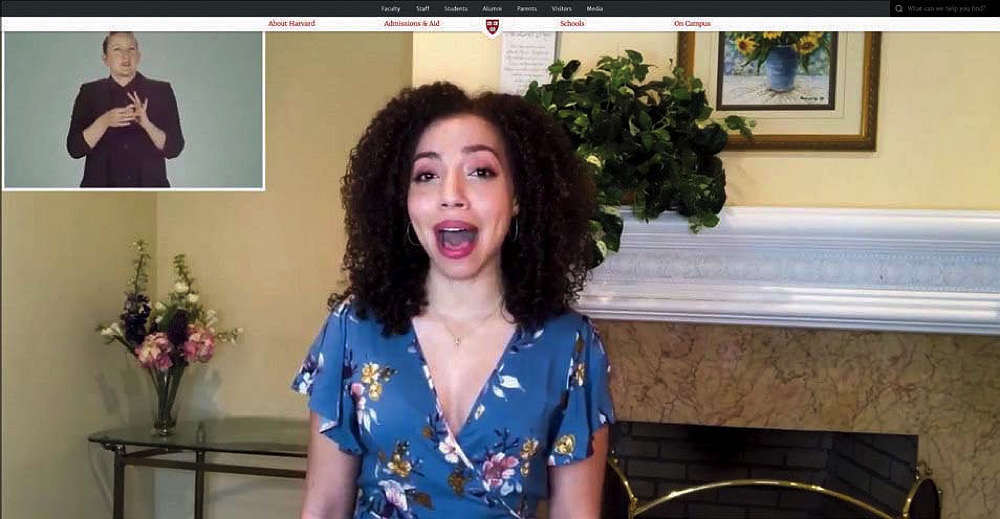
Ashley M. LaLonde
Screenshot by Harvard Magazine
Others found unique ways to articulate the prevailing sentiments. In their impeccably delivered undergraduate and graduate English addresses, Michael J. Phillips ’20 and Sana Raoof ’12, Ph.D. ’18, M.D. ’20, spoke immediately and intimately to the audience, one-to-one: impossible in the vastness of Tercentenary Theatre, but natural and even familiar in the Zoom era. After a sort of wordless blessing—his performance of a medley of “Simple Gifts” and the “Sarabande” from Cello Suite No. 3 in C Major, by J.S. Bach—with the last note ebbing, Yo-Yo Ma ’76, D.Mus. ’91, whispered an almost prayerful “Congratulations.” And Ashley M. LaLonde ’20, accompanied by Madeline A. Smith ’14, tugged at hearts by performing “Home,” based on Dorothy’s feelings about the place she’d been dispossessed of and longed to return to, from The Wiz. (Read about the morning program at harvardmag.com/comm-report-20.)
There were, inevitably, moments of humor. Introducing the honorary speaker the next morning, Bacow recalled inviting The Washington Post’s executive editor, Martin Baron, to attend, months earlier—and now, he quipped, “here we aren’t.” Conan O’Brien ’85, the seniors’ guest speaker, recalled telling an earlier class to break out of their cocoons—advice now necessarily modified, for viral conditions, to, “Stay in your cocoon! Stay!”
But with the planet wobbling alarmingly off its axis, there was plenty of fire and brimstone as well. At least two speakers—Raoof, and Business School dean Nitin Nohria—invoked the Marshall Plan in outlining the responses required, worldwide, to address the pandemic and economic crises (see harvardmag.com/comm-hbs-20). At the Medical/Dental Schools and Law School, respectively, Robert Satcher, M.D. ’94, and Bryan Stevenson, J.D.-M.P.A.’85, LL.D. ’15, recalled family experiences of discrimination and disadvantage—including the near-lynching of Satcher’s sharecropper great-grandfather, and Stevenson beginning his education in a rigidly segregated “colored school.” He urged the lawyers-to-be to “find ways to get proximate to the poor, to those who suffer, to those who are marginalized, to those who are excluded….” (Read more at harvardmag.com/comm-hms-20 and harvardmag.com/comm-hls-20).
The most urgent, sweeping challenges of the day were addressed head-on by Martin Baron in a blunt review of the threats to the free press, the freedom of expression—and, inevitably—the University’s pursuit of Veritas. “Only a few months ago, I would have settled for emphasizing that our democracy depends on facts and truth,” he began. “And it surely does. But now, as we can plainly see, it is more elemental than that. Facts and truth are matters of life and death. Misinformation, disinformation, delusions, and deceit can kill.”
Toward the end of his address, Baron continued, “To determine what is factual and true, we rely on certain building blocks. Start with education. Then there is expertise. And experience. And, above all, we rely on evidence.” As “education, expertise, experience, and evidence” are “devalued, dismissed, and denied,” the idea of objective fact is being undermined, “all in pursuit of political gain.” As evidence, Baron cited “a systematic effort to disqualify traditional independent arbiters of fact,” from the press to the “courts, historians, even scientists and medical professionals—subject-matter experts of every type.”
He cited W.E.B. Du Bois, A.B. 1890, Ph.D. ’95, who in 1935, distressed at how deceitfully America’s Reconstruction period was being taught, assailed the propaganda of the era. “Nations reel and stagger on their way,” Du Bois wrote. “They make hideous mistakes; they commit frightful wrongs; they do great and beautiful things. And shall we not best guide humanity by telling the truth about all this, so far as the truth be ascertainable?”
Baron concluded:
At this university, you answer that question with your motto “Veritas.” You seek the truth—with scholarship, teaching, and dialogue—knowing that it really matters.
My profession shares with you that mission—the always arduous, often tortuous and yet essential pursuit of truth. It is the demand that democracy makes upon us. It is the work we must do.
We will keep at it. You should, too. None of us should ever stop.
Bacow thanked him “for your own work to reveal the world as it is” (see harvardmag.com/comm-report-20).
The glue that holds this enterprise together, at Harvard, is the joint dedication, even under severely adverse conditions, to sustain a community committed to that pursuit of truth, and to one another’s ability to do so.
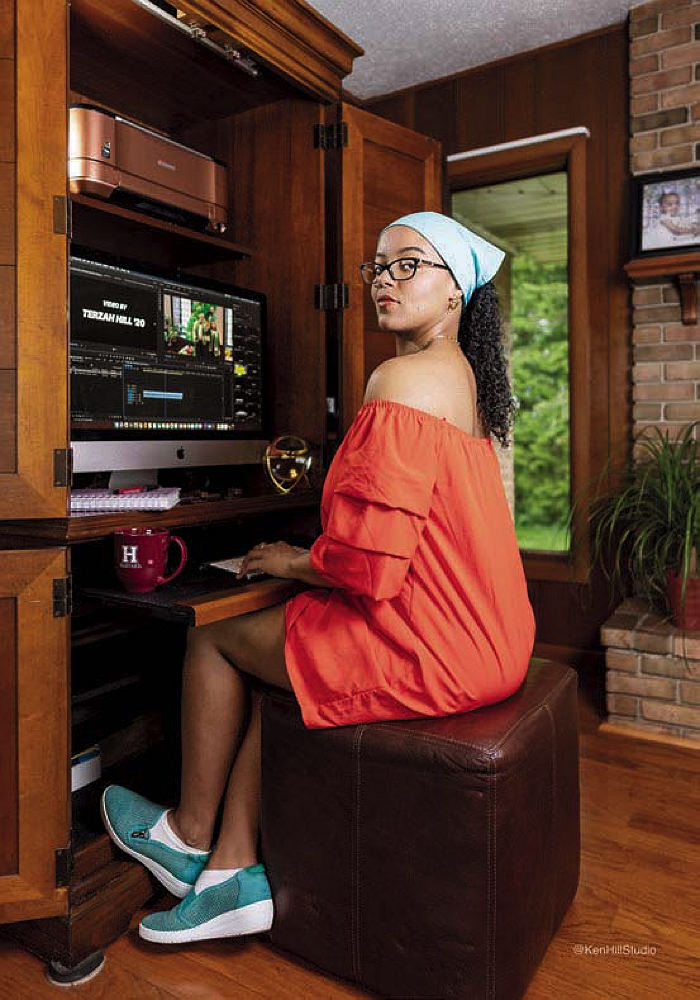
Terzah Hill
Photograph by Ken Hill Studio
Some of that labor takes place selflessly, out of sight. Working from her family home in Saline, Michigan (near Ann Arbor and one of America’s great public universities), Terzah Hill ’20 spent much of the last month of her senior year editing 1,021 of her classmates’ video submissions of special moments and memories into a presentation for the Thursday afternoon College celebration—while also directing the House faculty deans’ TikTok-inspired video greetings to their departing students. Amazingly, she had earlier done similar work for the admissions office, preparing the video welcome to the perhaps-about-to-arrive class of 2024 (whose “Visitas” was necessarily conducted virtually as well). Her reaction to this behind-the-scenes going-and-coming experience, on others’ behalf: “Bittersweet.”
More visibly, Heather Zimmerman did the signing for the morning video presentations (for example, see the Baron and Bacow photographs above)—a service she has performed at prior Commencements.
The most cathartic moment in the University’s morning celebration—and the biggest one—came last, after interim Pusey Minister in the Memorial Church Stephanie A. Paulsell gave the benediction. She acknowledged the participants’ joy mingled with “a measure of grief” under the circumstances; wished for the graduates the “freedom to let your lives be shaped by your deepest questions and your fiercest hopes”; and reassuringly concluded, “May you and those you love travel safely through this time.”
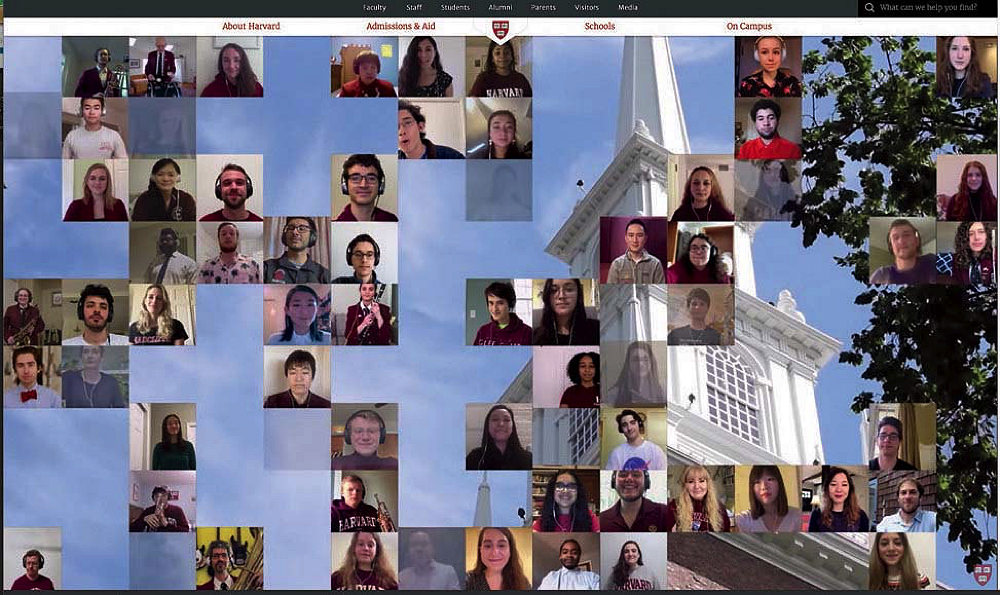
Then, through the melding of expert artistic and musical direction and superb technology, the “Harvard University Chorus”—a few voices, then dozens, with accompanying instrumentalists, many with headsets—combined forces in a rendition of “Fair Harvard,” sonic and visual, that by rights might well linger in memory “Till the stars in the firmament die.”
